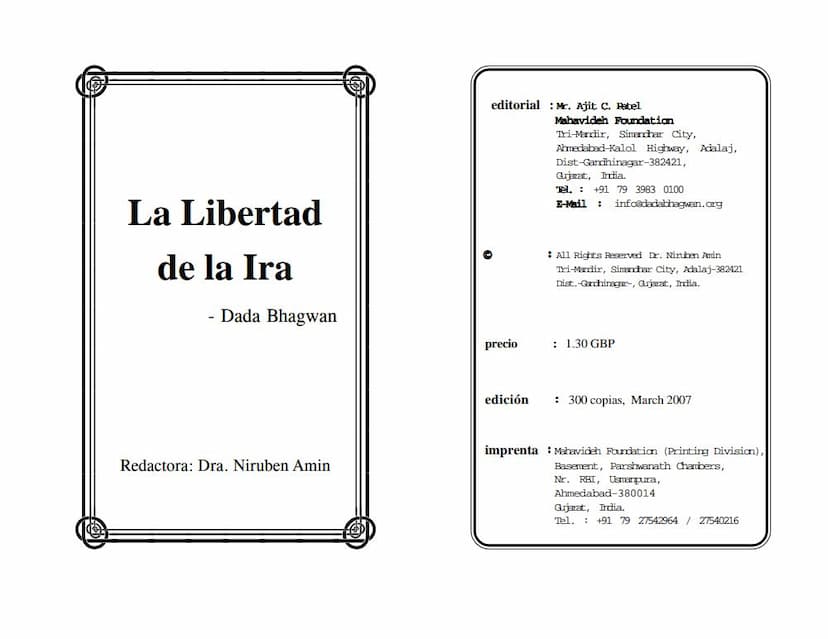Colera In Spanish Language
Added to library: September 1, 2025

Summary
Here's a comprehensive summary in English of the Jain text "La Libertad de la Ira" (The Freedom from Anger) by Dada Bhagwan, based on the provided text:
Book Title: La Libertad de la Ira (The Freedom from Anger) Author: Dada Bhagwan (Ambalal M. Patel) Publisher: Mahavideh Foundation
This book, translated from Gujarati, focuses on understanding and overcoming the weakness of anger, presented through the teachings of the enlightened being, Dada Bhagwan. The core message emphasizes that anger is a fundamental weakness that hinders spiritual progress and true freedom.
Introduction to Dada Bhagwan and Akram Vignan:
- The book begins by introducing Ambalal M. Patel, who spontaneously experienced Self-Realization in 1958 at the age of 48. This event led to the dissolution of his ego, and he became an instrument for the liberation of the world, identifying this fully manifested Self within him as "Dada Bhagwan."
- Dada Bhagwan's teachings are based on Akram Vignan, a direct and shortcut path to self-realization, meaning "without stages." This path bypasses the traditional, gradual steps of spiritual progress.
- He developed a scientific process called Gnan Vidhi, which can impart this knowledge of the Self in a short time (around two hours).
- Dada Bhagwan himself stated that his teachings are best understood in Gujarati, but he permitted their translation into other languages to share the essence of his message. Dr. Niruben Amin and later Shri Deepakbhai Desai continued his work after his passing.
Understanding and Overcoming Anger:
The central theme of the book is the analysis of anger from a spiritual perspective, as explained by Dada Bhagwan:
- Anger as a Weakness, Not Strength: Anger is consistently portrayed as a weakness, often mistaken for strength. True strength lies in remaining unaffected by insults or unfavorable situations.
- Causes of Anger: People tend to get angry when things don't go their way, when they feel misunderstood, when their viewpoint differs from others, when they are accused of being wrong, or when they believe they are right. It often arises from a lack of foresight or intuition.
- The Nature of Anger:
- It's a weakness that arises spontaneously.
- It blinds one to the underlying causes and realities.
- It's likened to setting oneself and others on fire, causing internal and external destruction.
- Anger is directly linked to ego, pride, attachment, and greed (kashayas).
- The Fallacy of "Necessary Anger": The idea that anger is sometimes necessary is a worldly notion born out of the inability to control it.
- Strength vs. Weakness in Handling Anger:
- Remaining silent when insulted is a sign of great inner strength.
- Confronting the strong and protecting the weak is a sign of true strength.
- People who don't get angry develop inner strength and are often more respected.
- The Impact of Anger:
- Anger destroys the fruits of past efforts, potentially wasting years of spiritual progress and creating negative karma for future lives.
- It transforms a human into a "beast."
- It creates agitation and disharmony, impacting relationships, especially within the family.
- Internal agitation and resentment (taanto) are also forms of anger, even if not outwardly expressed.
- The Role of Karma: Anger is often a manifestation of past karma. What one experiences as anger is the result of past actions. Blaming others for anger is a misperception; the root cause lies within.
- Distinguishing Anger (Krodh) from Annoyance (Gusso): Krodh is always linked to ego, while parental annoyance (Gusso) for the child's well-being can accumulate merit.
- The Path to Freedom from Anger:
- Understanding the "Knower": The true solution lies in realizing the "Knower" or the Self, who is separate from these weaknesses. This understanding is only possible through a living Gnani Purush.
- Gnan Vidhi: This scientific process can grant the knowledge of the Self and help eradicate the root causes of anger.
- Pratikraman (Seeking Forgiveness): This is a crucial practice involving:
- Acknowledging the mistake internally.
- Asking forgiveness from the Soul within the person wronged.
- Making a firm resolution never to repeat the mistake.
- It's emphasized that pratikraman should ideally be done internally, without necessarily confronting the other person directly.
- Destroying the Causes, Not Just the Results: The focus should be on eradicating the underlying causes of anger (ego, pride, attachment, greed) rather than merely suppressing the outward manifestation of anger.
- Changing Inner Intention: True change comes from altering one's deep inner intention.
- Self-Awareness: Being aware of when, where, and with whom one gets angry is the first step.
- Understanding the "Nimit" (Instrument): Recognizing that people who trigger our anger are merely instruments (nimits) for the unfolding of our past karma helps detach from the anger.
- Diet of Weaknesses: Anger, pride, attachment, and greed are sustained by ignorance. By ceasing to feed them with wrong beliefs and ego, they can be overcome.
Key Takeaways:
- Anger is a debilitating weakness that obstructs spiritual progress.
- True strength lies in equanimity and remaining unaffected by external circumstances or insults.
- The path to freedom from anger is through the knowledge of the Self, as imparted by a Gnani Purush, and the practice of pratikraman.
- Focusing on the root causes – ego, pride, attachment, and greed – is more effective than suppression.
- Understanding the science of karma and the concept of nimits is essential for detaching from anger.
The book provides a detailed Q&A format between Dada Bhagwan and an interrogator, illustrating these principles with practical examples and insights. It emphasizes that only by acquiring the true knowledge of the Self can one transcend these internal weaknesses and attain true freedom.